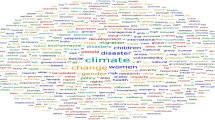Abstract
Conducting research in the wake of a catastrophic event imposes the dual responsibilities on researchers of protecting the rights of the survivors as research subjects, while also ensuring research quality and the dissemination and application of findings. This article, based partially on the authors’ experiences of conducting research in school districts following Hurricane Katrina, examines the ethical issues that arise when working with survivors, reticent organizations, and institutional review boards. Challenges experienced by researchers concerning access, informed consent, confidentiality, subject compensation, and enlisting the assistance of stressed institutions are described.
Similar content being viewed by others
References
Black, R. (2003). Ethical codes in humanitarian emergencies: From practice to research? Disasters, 27(2), 95–108.
Common Rule, Subpart A, 45 CFR 46, 56 FR 28003 (1991); 70 FR 36325 (2005). Retrieved November 18, 2006, from http://www.hhs.gov/ohrp/humansubjects/guidance/45cfr46.htm.
Elliott, D., & Stern, J. E. (Eds.). (1997). Research ethics: A reader. Hanover, NH: University Press of New England.
Family Educational Rights and Privacy Act of 1974 20 USCS § 1232 g; 34 CFR Part 99 (1974).
Fleischman, A. R. & Wood, E. B. (September 2002). Ethical issues in research involving victims of terror. Journal of Urban Health: Bulletin of the New York Academy of Medicine, 79(3).
Fry, C. L., Ritter, A., Baldwin, S., Bowen, K. J., Gardiner, P., Holt, T., Jenkinson, R., & Johnston, J. (2005). Paying research participants: A study of current practices in Australia. The Journal of Medical Ethics, 31, 542–547. Retrieved December 17, 2006, from http://www.jme.bmj.com.
Grady, C. (July 2005). Payment of clinical research subjects. The Journal of Clinical Investigation. 115(7), 1681–1687. Retrieved December 19, 2006, from http://www.jci.org/cgi/reprint/115/7/1681.
Jacobsen, K., & Landau, L. B. (2003). The dual imperative in refugee research: Some methodological and ethical considerations in social science research on forced migration. Disasters, 27(3), 185–206.
Kilpatrick, D. G. (2004). The ethics of disaster research: A special section. Journal of Traumatic Stress, 17(5), 361–362.
Merriam, S. B. (1998). Qualitative research and case study applications in education. San Francisco, CA: Jossey-Bass.
Munro, E., Holmes, L., & Ward, H. (2005). Researching vulnerable groups: Ethical issues and the effective conduct of research in local authorities. British Journal of Social Work, 35(7), 1023–1038.
Protection of Human Subjects, 45 CFR 46 (2005). Retrieved December 8, 2006, from http://www.nihtraining.com/ohsrsite/guidelines/45cfr46.html.
Raftery, J. (1997). Doing better than the media: Ethical issues in trauma research. The Australasian Journal of Disaster and Trauma Studies. Retrieved December 17, 2006, from http://www.massey.ac.nz/~trauma/issues/1997-2/raftery1.htm.
Ramcharan, P. (2001). Judging the ethics of qualitative research: Considering the ‘ethics as process’ model. Health and Social Care in the Community, 9(6), 358–366.
Rosenstein, D. L. (2004). Decision-making capacity and disaster research. Journal of Traumatic Stress, 17(5), 373–381. October.
Stalcup, C. M. (2004). Reviewing the review boards: Why institutional review board liability does not make good business sense. Washington University Law Quarterly, 82, Wash. U. L. Q. 1593. Retrieved November 28, 2006, from http://law.wustl.edu/WULQ/82-4/index.html.
Stern, J. E., & Lomax, K. (1997). Human experimentation. In D. Elliott & J. E. Stern (Eds.), Research ethics: A reader (pp. 286–295). Hanover, NH: University Press of New England.
Texas Education Agency. (2005). Hurricane-related information. Retrieved 01/14/07 from http://www.tea.state.tx.us/hcane/ [See also http://www.tea.state.tx.us/press/hurricanegrant.pdf, accessed 1/14/07; http://www.tea.state.tx.us/hcane/KatEvaMap.pdf, accessed 1/14/07].
The National Commission for the Protection of Human Subjects of Biomedical and Behavioral Research. (1979). The Belmont report: Ethical principles and guidelines for the protection of human subjects of research. Washington, DC: Government Printing Office. Retrieved October 25, 2006, from http://ohsr.od.nih.gov/guidelines/belmont.html.
The role of social science research in disaster preparedness and response: Hearing before the Subcommittee on Research Committee on Science. House of Representatives, 109th Cong., 1. (2006). Retrieved November 18, 2006, from http://commdocs.house.gov/committees/science/hsy24463.000/hsy24463_0f.htm.
Tomaselli, K., McLennan-Dodd, V., & Shepperson, A. (2005). Research to do, results to sell: Enabling subjects and researchers. Society in Transition, 36(1), 24–27.
Wendler, D., Rackoff, J. E., Emanual, E. J., & Grady, C. (2002). The ethics of paying for children’s participation in research. The Journal of Pediatrics, 141(2), 166–171.
Author information
Authors and Affiliations
Corresponding author
Additional information
This material is based upon work supported by the National Science Foundation under Grant No. 0036566000. Any opinions, findings, and conclusions or recommendations expressed in this material are those of the author(s) and do not necessarily reflect the views of the National Science Foundation.
Rights and permissions
About this article
Cite this article
Barron Ausbrooks, C.Y., Barrett, E.J. & Martinez-Cosio, M. Ethical Issues in Disaster Research: Lessons from Hurricane Katrina. Popul Res Policy Rev 28, 93–106 (2009). https://doi.org/10.1007/s11113-008-9112-7
Received:
Accepted:
Published:
Issue Date:
DOI: https://doi.org/10.1007/s11113-008-9112-7




